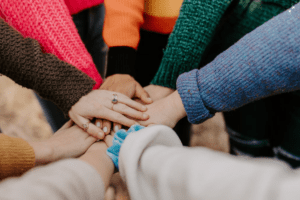I first heard of Google Drive when I was in fourth grade about 11 years ago. Once a week, my peers and I would work on digital projects in the computer lab. Since then, Google Docs has become, weirdly, one of the most significant storage spaces in my life.
I had the great luck of attending the same school throughout my primary and secondary studies. As a result, my email account linked to my Google Cloud stayed unchanged, accumulating up to 10 years’ worth of work, research, and learning. It had everything from poorly written sentences about the dangers of alcohol addiction I wrote when I was 9 years old, to most (if not all) of my IB diploma coursework. There were the prompts I prepared for college applications, the whole design for a made-up nation I was asked to create in 2011, my final thesis for the IB candidacy, hundreds of essays, presentations, and even more sets of notes and readings.
Academically, my small Drive account floating somewhere in the Google Cloud reflected the evolution of my talents from when I was a 9-year-old child to when I graduated from high school at the age of 18. It was evidence of my learning throughout the most critical phase of my life regarding brain development. It gathered so much material that even as a college student, I would rely on it to quickly refresh my memory on old concepts like the Haitian Revolution or the Soviet Union’s collapse. At times, it was also amusing to look at, and even nostalgic. Most importantly, it was all mine, or so I used to tell myself.
It’s been three years since I graduated from high school, and I’d had no trouble accessing my old storage space. One day, however, I was thrown out of my account and was no longer permitted to log in. I stared at the message reading “access denied” on my computer screen, fearing that I’d lost my prized information. After a few hours of confusion, I heard from several sources that because the email address linked with my Google Drive belonged to the school, they were free to shut it off at any moment. And the moment had finally arrived. Even after contacting the school about it, I was only granted temporary access to my account and its services for a period of 10 days.
It was something I was always aware of: I did not own my own email account or the information contained within it. However, it wasn’t until I lost it that I began to question the uncertainty around digital data ownership.
The information and documents linked with my Gmail, in my opinion, belonged to me. After all, it served as my own library where I saved my work, thoughts, ideas, and projects. Not only that, but I might claim that, as with most data ownership issues, I was led to assume it was mine. Indeed, the school never openly urged me to move my information, nor did they remind me of my restricted ownership of the account; instead, I was motivated, and often obliged, to put the information on the cloud they owned.
While some may claim that data protection is currently more important than ever, the extensive control of customer data is a relatively recent phenomenon in democratic countries. In my case, I thought about how, in the past, students were not expected to give in their notebooks at the conclusion of the academic year, nor was the information gathered by those notebooks stored by schools to be kept under their control forever. On the contrary, they had the right to keep what they had spent the time, energy, and discipline to create.
Following that same thought, even if I could go back in time and redo all my work on paper, I wouldn’t be able to do so. As we have worked to create a paperless society, educational systems have shifted to favor digital platforms and workplaces over paper-based ones. Not only are we being requested to share, email, or upload our work, but many lectures are now being designed to appeal to computer users by becoming faster-paced, therefore making it difficult for people who write on paper.
Yes, we cannot dispute that the weaponization of data is one of the primary causes behind the tremendous growth in data monitoring. If I put myself in their position, I believe it is natural for the school to want to safeguard its reputation. After all, they wouldn’t want their brand harmed if an alumni exploited their old account for unethical purposes. However, we must also consider that data surveillance and ownership have become a significant source of profit for institutions who have now adopted these practices as a form of people profiling. Nowadays, a large number of companies, whether tech-based or not, survive on data analysis, which encourages people to maintain as much information as possible on platforms that service providers may access, alter, and store.
As a result, consumers are left wondering to what degree they own the information obtained by services like Roomba, or the images they upload on Instagram, or, like me, the schoolwork they complete. More importantly, a lack of data ownership regulation has raised concerns about the fate of the data we have supplied to services after the service has been performed. Indeed, most organizations and companies have the legal authority to retain data indefinitely, even after we have severed relations with them – even after we have graduated.
Furthermore, although a conceivable “solution” may be to remove all of the material in my Google Drive connected with my now-locked high school account and transfer it to a new Cloud, the latter demonstrates another obvious issue with data ownership. We cannot dispute that there is a fundamental flaw in our notion of data ownership if we are continually transferring our belongings from one cloud to another just because we cannot be certain of total control over our own things.
Even worse, this so-called solution demonstrates how while we consumers are permitted to live in the cloud, we must do so under the authority of an institution that gets to purchase and monitor portions of the Cloud itself. For example, in the case that I switched my Google Drive data to my personal iCloud, I would simply be handing over control from my school to Apple, which holds the encryption key to every backed-up email, photo, note, and file in our accounts. After all, it is an unavoidable fact that, as a result of weak laws and transnational data-ownership agreements, we are no longer the consumer but the product itself. We are now users who, voluntarily or unwillingly, must give up their right to their own information in return for digital services that have become indispensable. Users that work, interact, and socialize within their own virtual workspaces, hangout rooms and shopping malls that are not truly theirs – hypnotized by a promise of privacy that is not really there.
How much control should we have over our data? That is the question I asked myself following the incident with my high school, which is the reason I started writing this piece. Unfortunately, as with other concerns about the consequences of digital products and services, such as data storage providers and data itself, there is no simple answer.
It is evident that an anarchic environment, whether real or virtual, is not only unsustainable but also dangerous. Giving individuals unlimited autonomy over their digital activities without the ability of profiling them may and has had disastrous repercussions. Consider the Four Horsemen of the Information Apocalypse: terrorists, drug dealers, pedophiles, and organized crime, all of whom flourish on untraceable platforms and impenetrable encrypted information.
Still, as we continue to immerse ourselves in a digital environment, I feel it is critical that we consider how our rights will be transferred from the physical to the virtual. Privacy and property, whether real or virtual, are two fundamental rights that underpin democracies all around the world. However, users have not been able to exercise these rights as easily online. Whatever the solution, democracies must build a clear, equitable, and accessible legal framework surrounding data ownership, monitoring, and monetization if we are to live online to the extent that society wants. Like any other, the latter must serve as a social contract in which civilians do not sacrifice their basic rights but agree to a degree of regulation in the name of safety and protection.
It is also critical to recognize that civil society is not large enough, and companies are too self-interested, which is why governments must encourage institutions to provide data gathering and monitoring frameworks that do not infringe on the fundamentals of democracy. After all, if we are expected to preserve the same sense of civil responsibility in the virtual world, we can only expect the government and corporations to respect our rights with the same care.
Featured image by: Forbes




